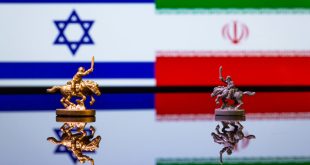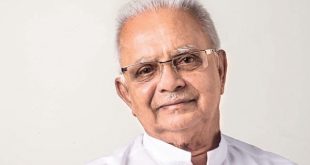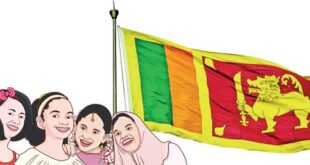In what is largely seen as a sham election, Afghanistan’s capital of Kabul and a few other areas where United States and NATO troops are in control, went to the polls yesterday to elect a president. Though the West tries to portray the election as a healthy sign of Afghanistan’s fledgling democracy, independent analysts say a majority of the Afghan people see the exercise as a move to preserve the office of a corrupt politician who has been more a US agent than a president.
The incumbent President, Hamid Karzai, who, many say, is likely to be re-elected for a second and final term, has been derided as Kabul’s mayor, whose writ does not go beyond the capital city. In the country’s south, where the Taliban rebels’ resistance to foreign occupation, is strong, the polls were expected to be largely a non-event, with a large number of Pashtuns, who constitute 60 percent of the Afghan population, abstaining from voting.
Analysts predict that the voter turnout would be around 30 percent. Besides, independent observers say they fear the polls would be rigged. According to one observer, 3 million duplicate polling cards are in circulation — about 18 percent of Afghanistan’s voting population of 16-17 million. Other reports claim that the number of extra polling cards in circulation is 17 million, almost equal to the voting population. Analysts say the fraud is necessitated by Karzai’s fear that the election would go into the second round, during which defeating a candidate backed by a combined opposition would be a tougher task. One pre-poll survey shows Karzai will get 36 percent of the vote and another says 44 percent — less than the 51 percent necessary to avoid a runoff. Both these polls show that the combined opposition’s strength is more than 55 percent. However, it is unlikely that the entire opposition would back former foreign minister Abdullah Abdullah, the likely contender for the runoff with Karzai, because the opposition is also made up of US lackeys.
Karzai, a former CIA operative and US oil company employee, apparently does not want to take a chance and go for the second round. He has used everything at his disposal to win this election by hook or by crook. Vote-buying, intimidation and offers of bribes to warlords were common during the campaign.
The role the warlords play in Afghanistan is no less significant. The warlords are well-armed mini dictators terrorizing the people under their control and ruling a well-defined territory within which their law is supreme. Many of the warlords are also drug lords, thriving on the opium trade, and would sell their loyalty to the side that pays them more. They are a commodity in Afghan politics and the war. They were bought both by the Russians and the Americans during the ten-year occupation of Afghanistan by the Soviet Union from 1979.
In the run-up to yesterday’s elections, Karzai bought many warlords. In fact, Karzai’s running mate, Muhammad Qasim Fahim, is such a warlord from the minority Tajik community.
Many diplomats say that the degree of malpractice at yesterday’s election was so acute that they fear an Iran-like post-poll protest by opposition supporters.
Even the United States acknowledged that the vote would be not free and fair. Richard Holbrooke, who is US President Barack Obama’s special envoy to Afghanistan and Pakistan, said this week, “No election is perfect. Don’t expect a perfect election.”
Last month when he was asked about the allegations of fraud in voter registration, Holbrooke said it worried the United States. “We are worried about voters, who will be unable to reach polling places because of insecurity, and we are worried about the accuracy of the vote count, and we are worried about the ability of women to vote.”
What is interesting is that the allegations of large-scale election fraud come largely from the US media. Elizabeth Rubin in an article she wrote for the New York Times magazine quoted a western intelligence official as saying that the Karzai family has opium and blood on its hands.
“They (the Karzai family) systematically install low-level officials up to provincial governors to make sure that, from the farm gate, the opium is moved unfettered. When history analyses this period and looks at this family, it will uncover a litany of extensive corruption that was tolerated because the West tolerated this family,” she wrote in the article adding that “this is the man who has been presented internationally as the symbol of the ‘democracy’ being forged by the US and NATO in Afghanistan.”
These reports further confirm that yesterday’s election was largely an exercise in installing not only a US puppet as president of Afghanistan, which has not breathed peace for the past 30 years, but also a corrupt leader who has given almost all the lucrative contracts to his brothers. For instance, his brothers supply cement for almost every project in Afghanistan.
According to an August 7 datelined Associated Press news item from Brussels, David Kilcullen, a US counterinsurgency expert who will soon assume a role as a senior adviser to Stanley McChrystal, the top US commander in Afghansitan, compared Karzai to South Vietnamese President Ngo Dinh Diem, a US puppet who was killed in a US-sponsored coup in 1963.
“He has a reasonably clean personal reputation but he’s seen as ineffective; his family (members) are corrupt; he’s alienated a very substantial portion of the population. He seems paranoid and delusional and out of touch with reality. That’s all the sort of things that were said about President Diem in 1963,” Kilcullen told the U.S. Institute of Peace.
Needless to say, the Taliban are gaining more popularity in Afghanistan. They are moving freely and carrying out bomb blasts and suicide missions with much ease. During the first 20 days of this month, some 50 US and NATO troops have been killed. The figure for last month was 75. In addition, every month some 150 government troops are also killed. As election day approached the Taliban intensified their attacks and brought the war to Kabul, with the NATO headquarters and the nearby US embassy being two of their high-profile targets. The effectiveness of the Taliban attacks was such that some US officials are openly advocating talks with moderate Taliban elements.
These developments come amidst reports that the American people are increasingly becoming disillusioned with the Afghan war. which is being referred to now as Obama’s war because of the US president’s determination to fight to the end.
According to the latest opinion polls conducted by the Washington Post and ABC News, Americans are increasingly soured on the war in Afghanistan, with 51 percent saying the war is “not worth fighting” and only 24 percent supporting the Obama administration’s escalation of the war. Even those who support the war say that the US should reduce the number of troops in Afghanistan.
Yet the Obama administration is hell bent on continuing former US President George W. Bush’s dirty war, which has killed more than 25,000 Afghans, mostly civilians, since the US invasion of their country in October 2001.
The United States which is sending more troops to Afghanistan is set to intensify the war after yesterday’s elections, because it has run out of excuses that blamed others for the lack of progress or war victories in the Afghan war. In the past, the US blamed Pakistan for the resurgence of the Taliban in Afghanistan accusing Islamabad of doing very little to stop crossborder terrorism. Now that Pakistan is doing more than its bit of the counterinsurgency operation aimed at weeding out the Taliban threat — an operation that has taken the lives of more than 2000 Pakistan soldiers — the US and NATO troops stand exposed, unable to defeat the Taliban who are armed largely with AK-47 assault rifles.
 Sri lanka Muslims Web Portal Diversity and Inclusiveness
Sri lanka Muslims Web Portal Diversity and Inclusiveness



